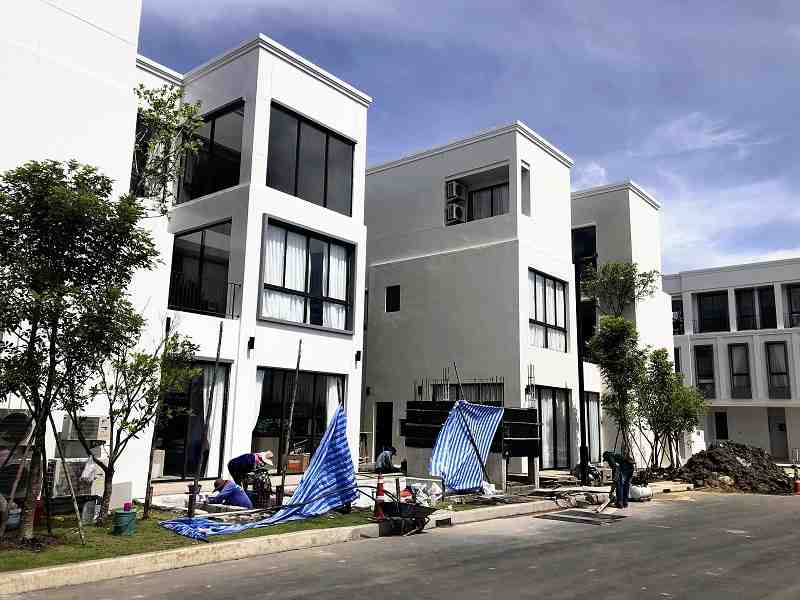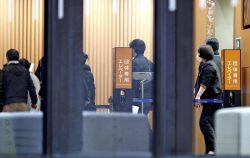
Under-construction residential buildings are seen on the outskirts of Bangkok in August.
7:00 JST, October 26, 2022
BANGKOK — Japan-affiliated real estate developers are ramping up their efforts in Southeast Asia on the back of the area’s recovering economy.
Though the novel coronavirus pandemic temporarily halted construction and sales, recent property-market splurges by the wealthy and middle-classes have helped spur economic activities, which are increasingly returning to pre-pandemic levels. However, real estate companies are now facing fresh challenges, such as soaring material costs and labor shortages.
On the outskirts of Bangkok, construction is proceeding apace on a 115-unit condominium being jointly developed by Kanden Realty and Development Co. and its local partner. The developers hope to woo wealthy local residents with a special “clubhouse” that features a fitness center and other facilities.
Construction was suspended in summer 2021 due to the pandemic, but work has now resumed with an eye on a spring opening.
“At one point, the future was uncertain,” said Kensaku Tanabe, head of the company’s Bangkok office. “But as Thailand’s real estate market has recovered, we’ve been speeding up the work process.”
In July, Mitsui Fudosan Co. announced its intention to open four serviced apartment properties in Thailand. “The timing of the announcement reflects the Thai government’s continued easing of entry restrictions for foreign travelers,” said an official of the company’s public relations section.
Market potential
Japan-affiliated companies are targeting Southeast Asia’s burgeoning wealthy and middle classes.
According to the World Bank, Malaysia’s gross domestic product was $11,371 per capita in 2021, about three times higher than 20 years ago, while the figure for Thailand was $7,233, a fourfold increase over the same time span. These figures would likely be even higher if the data was limited to large cities.
In general, when per capita GDP exceeds $3,000, a country is regarded as being a full-fledged consumer society. In light of this, the potential demand for real estate projects in Southeast Asia is high.
Although Southeast Asian countries have restrictions on foreign nationals purchasing real estate, observers say regulations are relatively loose for high-end condominiums and other properties in urban areas in an effort to attract overseas investment.
Prior to the pandemic, many Chinese and other foreign nationals purchased such properties, but this trend gradually slowed, partly due to coronavirus-related travel restrictions. Now, however, the property market is being increasingly buoyed by local residents’ purchasing power.
Nomura Real Estate Development Co. and Isetan Mitsukoshi Holdings Ltd. are developing a complex in Manila’s metropolitan area that includes condominium towers and commercial facilities. The high-end residential properties are designed around Japanese concepts and have been selling well among rich local residents.
“Some wealthy people in Southeast Asian own two properties — one in the city center and another in the suburbs,” said a person with close ties to a major Japan-affiliated company. “The market is solid.”
Challenges ahead
New challenges have emerged, however. Material prices have skyrocketed due to global inflation triggered by Russia’s invasion of Ukraine, and wage increases for local workers will be necessary to keep pace rising prices, which will eventually affect property prices.
In some countries, such as Vietnam, real estate markets are already shown signs of overheating, which could lead to further price hikes. There is also a shortage of labor in Southeast Asia. In Thailand and Malaysia, for example, many foreign workers temporarily returned to their home countries amid the pandemic. But re-entry procedures take time, which has been exacerbating the dearth of manpower.
An official of a major Japan-affiliated company operating in Thailand said: “If the worker shortage becomes serious, it may delay our plans. We’re making every effort to secure human resources,”
Top Articles in Business
-

Prudential Life Insurance Plans to Fully Compensate for Damages Caused by Fraudulent Actions Without Waiting for Third-Party Committee Review
-

Narita Airport, Startup in Japan Demonstrate Machine to Compress Clothes for Tourists to Prevent People from Abandoning Suitcases
-

Japan, U.S. Name 3 Inaugural Investment Projects; Reached Agreement After Considerable Difficulty
-

Toyota Motor Group Firm to Sell Clean Energy Greenhouses for Strawberries
-

SoftBank Launches AI Service for Call Centers That Converts Harsh Customer Voices into Softer Voices
JN ACCESS RANKING
-

Japan PM Takaichi’s Cabinet Resigns en Masse
-

Japan Institute to Use Domestic Commercial Optical Lattice Clock to Set Japan Standard Time
-

Israeli Ambassador to Japan Speaks about Japan’s Role in the Reconstruction of Gaza
-

Man Infected with Measles Reportedly Dined at Restaurant in Tokyo Station
-

Videos Plagiarized, Reposted with False Subtitles Claiming ‘Ryukyu Belongs to China’; Anti-China False Information Also Posted in Japan
























